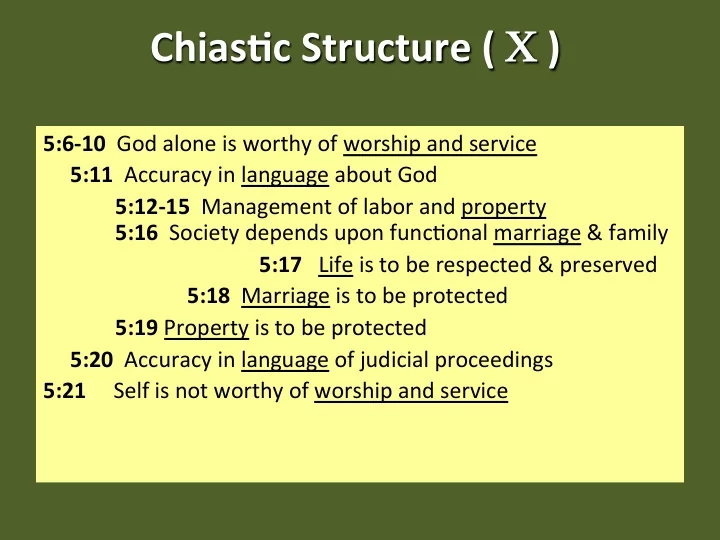

Chias&c Structure ( Χ ) 5:6‐10 God alone is worthy of worship and service 5:11 Accuracy in language about God 5:12‐15 Management of labor and property 5:16 Society depends upon func;onal marriage & family 5:17 Life is to be respected & preserved 5:18 Marriage is to be protected 5:19 Property is to be protected 5:20 Accuracy in language of judicial proceedings 5:21 Self is not worthy of worship and service
God ’ s Design of Society LIFE (protected) LIFE (jeopardized) MARRIAGE & FAMILY MARRIAGE & FAMILY (strong & functioning) (weak & dysfunctional) LABOR & PROPERTY LABOR & PROPERTY (respected & productive) (demeaned & wasted) INTEGRITY of INTEGRITY of COMMUNICATION COMMUNICATION (consistently states truth ) (deceitfully professes truth for agendas) HEART ALLEGIANCE (to HEART ALLEGIANCE (to God) self)
“ He shall restore what he took by robbery, or what he got by extor2on, or the deposit which was entrusted to him, or the lost thing which he found . ” Levi&cus 6:4
“ It is the vulnerability of the weakest seller of labor that makes this law necessary. God imposes this law because of what I call the priestly factor in free market pricing. This factor is seldom if ever discussed by free market economists. When human life is at stake – beyond the modern economic principle of marginalism– unrestricted free market competition is in some instances not morally valid. All real-world societies recognize this fact, but free market economists rarely do, since they are committed to a supposedly value- free (ethically neutral) analysis. ”
“ This law does not prohibit other forms of competition among workers. It prohibits only this one, which reflects the character of God in his gracious dealings with men in history. There is no law in the Bible against one worker ’ s willingness and ability to offer to work for less per day or less per hour than another worker presently does. . . . The legal right to make a better offer is inherent in the biblical requirement that we become more profitable servants. ”
“ The employer ’ s economic problem is his lack of knowledge about the competence of the new worker. The employer uses a delayed payment scheme in order to minimize his search costs in estimating the competence of new workers . Accurate knowledge is not a zero-price resource. Employers try to obtain such knowledge as cheaply as possible. They use the new worker ’ s willingness to accept delayed payments as a cost- effective substitute for more detailed information regarding the worker ’ s abilities and his willingness to work. ”
politics Pressure of Life ethics Sequence Logical epistemology metaphysics Yahweh or an idol?
“ This means that the gleaning law was a form of conditional charity in each individual recipient ’ s case, although the loss was compulsory from the point of view of the landowner. Biblical charity is always conditional . Charity is not to subsidize evil, for it is an act of grace. Unconditional charity is antinomian . In a fallen world, unconditional charity will eventually subsidize evil. This is even more true of legal entitlements to other people ’ s wealth. Such wealth transfers are not a form of charity. They are legislated theft. They represent a perverse modification of the eighth commandment: “ Thou shalt not steal, except by majority vote. ”
“ The obedient owner did not pay salaried harvesters to collect marginal pickings. This lowered his labor cost per harvested unit of crop. But the net income loss as a result of gleaning did lower his total return from his land and planting expenses. There is no doubt that this economic loss of net revenue constituted a form of compulsory charity. ”
“ How did piece-rate harvesters suffer a reduction of total income? Because they could not lawfully gather the total crop of the field or the vineyard. Each worker had to leave some produce behind, which means that his income suffered. This also means that the poor of the community were in part funded by the slightly less poor : the piece- rate harvesters. The harvesters were reminded of the burdens of poverty. ”
“ This in effect became an unemployment insurance program for the harvesters. They knew that if they later fell into poverty, they would probably be allowed to participate as gleaners. They forfeited some income in the present, but they did so in the knowledge that in a future crisis, they would be able to gain income from gleaning. Both the land owner and the piece-rate worker financed a portion of this morally compulsory insurance program. ”
Recommend
More recommend